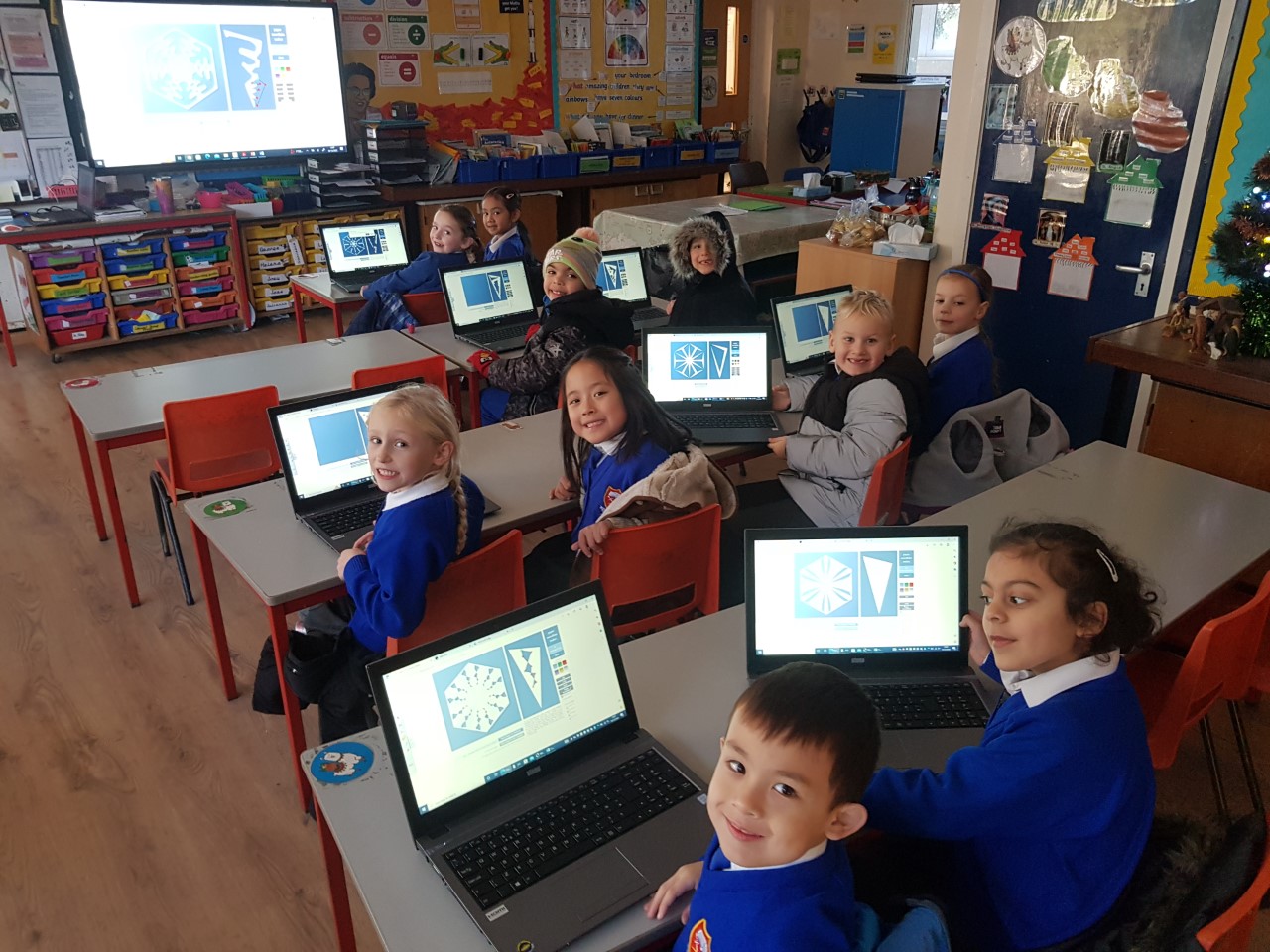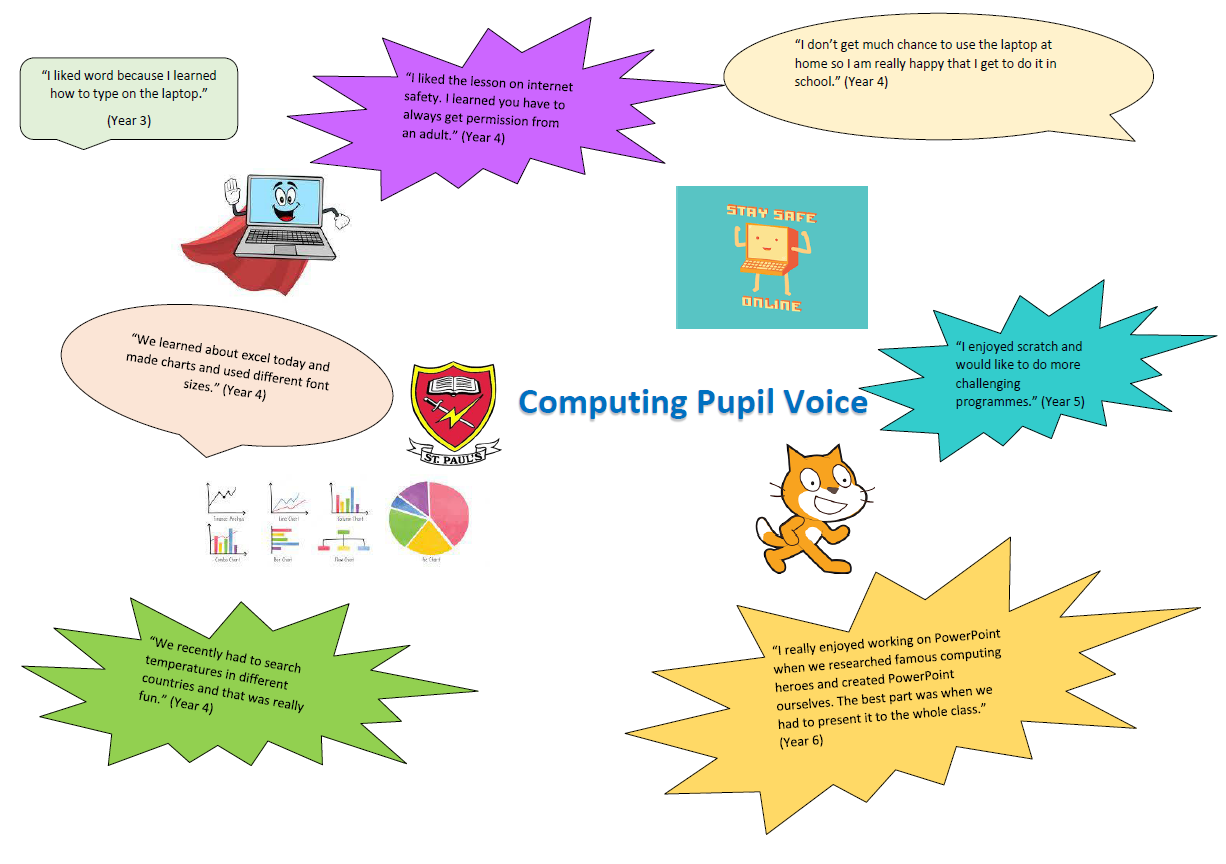Computing
Intent, Implementation and Impact
The national curriculum for computing aims to ensure that all pupils:
- can understand and apply the fundamental principles and concepts of computer science, including abstraction, logic, algorithms and data representation
- can analyse problems in computational terms, and have repeated practical experience of writing computer programs in order to solve such problems
- can evaluate and apply information technology, including new or unfamiliar technologies, analytically to solve problems
- are responsible, competent, confident and creative users of information and communication technology
Intent
At St Paul’s school we recognise the importance of digital and computational literacy in an increasingly more technologically advanced world. In an age where the understanding and use of computers has become pivotal to daily life, we seek to educate our children as responsible, effective and inquisitive users of computers and computational systems. Our intention is to utilise a range of technology in different applications to foster all the varied features of DESIRE and CST (Catholic Social Teaching).
We believe that the best way to prevent the misuse and misapplication of technology is through a thorough education in both how and why we use technology. We aim to enable our children to have a clear understanding of how to find, evaluate, analyse and present digital information. This also includes how to safely acquire and evaluate information from a range of online sources. We wish for our children to be able to understand and freely apply the fundamental principles of programming including logic, algorithms, abstraction, writing simple programs, recognising and solving problems in code and accurate input of data. Our children should have a reliable toolkit of skills to use by the time they reach Upper Key Stage 2 to fulfil any tasks or challenges set by their teachers and those they encounter outside of school. We encourage fluency in all aspects of technology and hope to embed our uses of technology across the curriculum. We recognise in particular the importance of E-safety and ensure that the children have a good understanding of this. We continue to regularly reinforce the ‘rules’ for safe use of the internet throughout the academic year.
Computing is a seamless cross curricular subject which supports many disciplines such as D&T, science and topic as children can use technology and computational skills to research and create and present content using their oracy skills.
We ensure that computing is part of the children’s learning at all levels with good access to a variety of different systems and programs of study. Our computing curriculum is adapted to suit the greater digital fluency our children gain as they go through the school. We also ensure that we always model positive uses of technology as well as digital literacy and confidence. We hope to lay the foundations for each child to leave this school and be able, creative and confident users of technology.
Catholic Social Teaching
Across all Key Stages children will explore and respond to key issues such as digital communication, cyberbullying, online safety, security, plagiarism and social media. In addition to the online safety model in KAPOW, we also teach these topics through our RHE module where we emphasis and reiterate CST values to our pupils. We put particular emphasis on the impact of these key topics on others and reflect on feelings, dignity and mutual respect which are central to the CST principles.
SEND Intent
Inclusion is at the centre of our planning and we support our SEND children to reach their maximum potential by ensuring children can access all areas of the computing curriculum based on their strengths and needs and challenge them by providing opportunities to work with others through collaborative and engaging software and online tools. The wide variety of programs we have carefully selected to follow ensure that every child’s learning is supported by enabling them to achieve. The different learning styles of the wide range of topics provides the possibility for each and every child to optimise their learning potential.
Computing is a seamless cross curricular subject which supports many disciplines such as D&T, science and topic as children can use technology and computational skills to research and create and present content using their oracy skills.
Implementation
Teachers create a positive attitude to learning computing within their classrooms and reinforce an expectation that all children are capable of achieving high standards.
We ensure that our computing curriculum meets with all the standards expected by the national curriculum and strive to exceed these requirements whenever possible. Our learning approach can be summarised as the following:
A bespoke curriculum which is adapted to the ever-changing needs of the class – We do not restrict our teachers to a singular scheme of work. Instead we work together in teams and as a whole school to provide a clear progression of skills and sufficient coverage of national curriculum objectives. However, across all key stages, we ensure our children have a very clear understanding of e-safety. We follow the KAPOW learning scheme which is aligned with the full national curriculum and develops pupils’ knowledge across: Digital Literacy and Online Safety; Computational Thinking and Computers and Hardware. The scheme ensures sequential learning throughout all key stages.
- In EYFS we focus more on using the Ipads and programming simple physical robots. At this stage the children are simply familiarising themselves with technology in small groups with the support of our dedicated IT technician.
- In KS1 we use a mixture of Ipads and laptops with a focus on simple coding games to introduce the earliest concepts of programming. We use the KAPOW learning scheme for KS1 where a wide range of topics such as Bee-Bot, Data handling. Once per term at minimum we have the children work on simple uses of Microsoft office, retrieval and manipulation of data.
- In LKS2 children build on their earlier learning with increasingly complex coding applications – moving onto higher levels of schemes in KAPOW such as weather forecasting, Scratch and website design. They work to improve their understanding of programming and debugging concepts as they work on increasingly complex code. They will also begin to have a greater grasp of different ways to present information and will gain fluency in word processing and PowerPoint presentations. Children showcase their work and share their ideas and creations with their peers, allowing them to continuously develop their oracy skills.
- In UKS2 children begin to look at the most complex systems of code in KAPOW. They will be studying in much more depth and become familiar with the logic that underpins them. They will work with technology to produce multi-media projects and will be able to independently use office to fluently present information. They will use search engines discerningly to produce relevant research pertinent to their topics.
- Across all Key Stages children will have the opportunity to explore and respond to key issues such as digital communication, cyberbullying, online safety, security, plagiarism and social media.
A curriculum that progresses from skills based to application based learning - Computing is given dedicated time regularly across the timetable. This starts with smaller discrete group sessions weekly in EYFS which is linked into the curriculum. This moves onto a weekly discrete session for the whole class in KS1 where children begin to learn the fundamental skills for coding and information retrieval and manipulation. In LKS2 we begin to embed computing into the curriculum and build on those earlier skills. In UKS2 computing moves further into being embedded and becomes far less discrete. This is because the children are deepening their understanding of the various skills through application rather than just learning the skills.
A range of opportunities to cultivate their love for computing – We strive to make use of, and model, good and creative use of technology in the classroom. We use technology as a teaching aid across the curriculum in many lessons. We work hard to ensure our curriculum is engaging and encourage children to get involved in technology in a variety of different ways.
A variety of technological resources – We continue to expand the variety of the resources our children and staff have access to. From hardware like a range of simple programmable robots, to ipads and laptops dedicated to each Key Stage, to software to provide scope for a range of different activities. We aim to ensure that our hardware and software in always as up to date as possible and staff are aware of how best to utilise this technology.
Impact
Our approach to the computing curriculum results in a fun, engaging and adaptable computing education. We take the quality of our lessons very seriously and ensure we have plenty of evidence by tracking the children’s progression regularly by evaluating their progress in using programs to present information. This ensures that we have a good understanding of where our children are at and to inform their future planning. We focus on a system of deepening mastery that allows us to revisit misconceptions as we learn and progress before the children focus too much on the application process.
As we apply skills it gives us time to revise and check the children’s learning across different Key Stages. This also allows us to support varied paces in learning and make sure that all of our children are meeting the high standards that we expect in St Pauls. We make sure that we encourage all the qualities of DESIRE and CST in our computational learning and thinking and thus encourage the children’s creativity, enquiry and curiosity.
We strive to equip our pupils with experiences and subject specific knowledge that will continue to pay dividends throughout secondary school, higher education and even their future careers. Not only through methods and evaluation of research, but also information presentation, creativity and critical thinking. By providing children the opportunity to share their ideas to their peers, we build their confidence in their computing skills.
Our belief is that through computing at St Paul’s we will provide the foundations to enable them to pursue any of the interests or vocations that they wish to as they move onwards in their lives.

